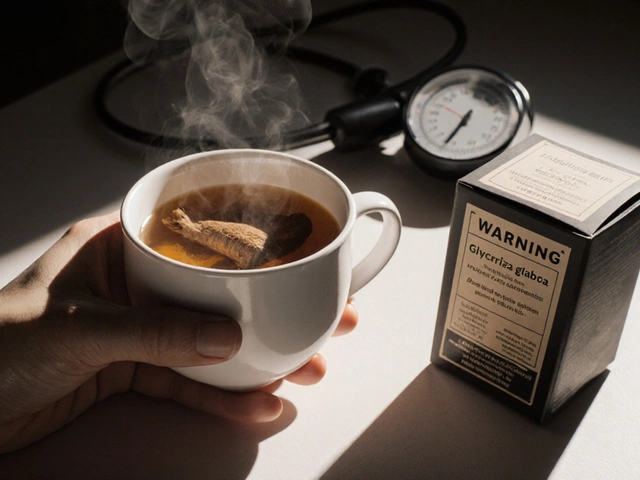Scroll through any supplement aisle or wellness feed, and ashwagandha pops up everywhere. You probably know someone who swears by it for stress or sleep. But does that hype match the facts—and more importantly, is ashwagandha actually safe to take?
People have used this herb in traditional medicine for centuries, especially in India. But just because something is 'herbal' doesn’t mean it’s risk-free. A few key questions keep coming up: Can you trust what’s inside the bottle? Who should actually avoid ashwagandha, even if friends claim it’s a miracle? And how do you figure out if a dose is too much?
Here’s the straightforward scoop: most healthy adults can take ashwagandha for short periods without running into trouble. But side effects do happen, and certain folks should keep clear. Anyone with thyroid problems, liver issues, or who is pregnant, needs to pay special attention. If you mix ashwagandha with some meds, things can get dicey fast.
The good news? If you use it wisely, pick the right source, and listen to your body, ashwagandha is pretty low-risk for most people. But don’t skip the details—what’s safe for your gym buddy might not be safe for you.
- Ashwagandha 101: What Is It, Really?
- The Science: Is It Actually Safe?
- Who Should Steer Clear of Ashwagandha?
- Possible Side Effects and What to Expect
- Tips for Safe (and Smart) Use
Ashwagandha 101: What Is It, Really?
So what’s the real deal with ashwagandha? This plant's full name is Withania somnifera, but don’t worry about remembering the Latin. Most people just call it ashwagandha or Indian ginseng. Unlike some trendy herbs that come and go, this one’s been part of Indian Ayurvedic medicine for over 3,000 years, mainly for dealing with stress, boosting energy, and helping with sleep.
You’re not alone if you thought ashwagandha was only a powder. It’s sold as capsules, powders, gummies, and even teas, usually made from its root or leaves. The root is what you’ll find in most quality supplements. What makes it interesting is a group of natural chemicals called withanolides. They’re the secret sauce believed to give ashwagandha its effects.
Here’s a quick summary of how people use ashwagandha, plus a comparison of what’s typically inside the stuff you’ll buy at a pharmacy or health store:
| Form | Common Use | Typical Dose (per day) | Main Active Stuff |
|---|---|---|---|
| Capsule/Pill | General stress, energy, sleep | 250–600 mg | Withanolides |
| Powder | Mixed with food/drinks | 1–2 teaspoons | Withanolides |
| Tea | Sleep, relaxation | 1–2 cups | Withanolides (less concentrated) |
So why are people reaching for ashwagandha now? Research done in the last few years shows that it might reduce the amount of cortisol (your stress hormone) in the body. That’s why people say it helps them chill out, sleep deeper, or feel less anxious. Some even claim it helps with strength and exercise recovery, though the science there is still early.
Even with its long history, ashwagandha’s pretty new to many of us. The takeaway? If you see this ashwagandha supplement on a shelf, you’re looking at a plant with serious roots—literally and culturally. Just don’t forget, what’s inside the bottle can vary a lot depending on the brand and how it’s made.
The Science: Is It Actually Safe?
If you search for ashwagandha studies, you’ll see a mountain of research over the last decade. But safety isn’t just about ancient tradition and hype—modern science has actually weighed in. Let’s look at what real data says about ashwagandha and health.
Most studies point out that adults who are healthy and take ashwagandha short-term (think about 8–12 weeks) usually don’t have big safety issues. The usual research doses range from 300 mg to 600 mg a day. Small clinical trials show that ashwagandha can lower stress, help with sleep, and even boost exercise performance—without serious side effects in most cases.
"In randomized clinical trials, ashwagandha was as safe as placebo when used for up to three months by healthy adults," says a 2022 review published in the journal Nutrients.
But it’s not a total green light for everyone. A handful of people in studies did have upset stomach, sleepiness, or a headache. A few rare reports even link ashwagandha to liver injury, though that mostly comes from high doses or mixing lots of supplements together.
Check out this table showing what’s been seen most:
| Possible Side Effect | How Common? | Usually Serious? |
|---|---|---|
| Nausea or upset stomach | Less than 5% | No |
| Sleepiness | About 2-3% | No |
| Headache | Rare | No |
| Liver injury | Very rare | Can be |
One thing most studies agree on: People with serious health issues or who take medications should double-check with their doctor before popping any ashwagandha supplement.
To sum it up, it’s not magic, but most folks can use ashwagandha with low risk if they stick to reasonable doses and pay attention to their bodies. Start small and don’t mix it with random over-the-counter or herbal stuff to play it safe.

Who Should Steer Clear of Ashwagandha?
This section is a must-read for anyone considering a bottle of ashwagandha, because not everyone should jump on the herbal bandwagon. Certain groups have real reasons to avoid it, and ignoring these can backfire fast.
First up: pregnant women. Studies and doctors agree—ashwagandha can trigger early labor or miscarriage. Breastfeeding moms should also pass it up; there just isn’t solid safety data.
Now, if you have autoimmune conditions like lupus, rheumatoid arthritis, or multiple sclerosis, ashwagandha could ramp up your immune system. That’s the last thing you want if your immune system is already in overdrive.
Folks with thyroid problems should be extra careful. Ashwagandha can boost thyroid hormone levels, which can spell trouble if you’re already on thyroid meds or have hyperthyroidism.
Anyone with liver issues should avoid this herb for now. While rare, there are reports of liver damage—at least five cases made it into published medical journals from 2019 to 2021. Not a huge number, but definitely not zero.
Medications are another biggie. If you take meds for anxiety, seizures, blood sugar, or blood pressure, ashwagandha might mess with how these drugs work. Sometimes it boosts effects, sometimes it cancels them out. Always check with a health professional first.
| Who Should Avoid Ashwagandha | Why |
|---|---|
| Pregnant women | Risk of miscarriage or early labor |
| Breastfeeding moms | Not enough safety data |
| People with autoimmune diseases | Could worsen symptoms by boosting immune activity |
| People with thyroid issues | May increase thyroid hormone levels |
| People on certain medications | Might interact and change how meds work |
| Liver disease patients | Cases of rare but severe liver problems reported |
Here’s what Dr. Yufang Lin from the Cleveland Clinic says:
“Just because a supplement is natural doesn’t mean you should take it, especially if you have certain health problems or are pregnant. Always ask a healthcare provider first.”
Bottom line? If you fall into one of these groups, leave that ashwagandha on the shelf. There are safer ways to manage stress or boost sleep than rolling the dice with your health. If you’re not sure, have an honest chat with your doctor before you even think about trying ashwagandha.
Possible Side Effects and What to Expect
If you’re thinking about giving ashwagandha a shot, it’s smart to know what could happen. While most people don’t have major issues, some side effects aren’t that rare, especially if you take high doses. Even though it’s a plant, ashwagandha can mess with your system in real ways.
The ashwagandha most folks buy is usually a root extract. When people get side effects, it’s usually one (or more) of these:
- Digestive Upset: Expect things like nausea, diarrhea, or an upset stomach. This happens more often if you’re using higher doses or taking it on an empty stomach.
- Drowsiness: Some people feel relaxed—so relaxed they get sleepy. If you start yawning during meetings after popping ashwagandha, you’re not alone.
- Headaches: A small number report headaches or a “foggy” feeling. If this starts happening, it’s usually a sign to take a break.
- Changes in Mood: Most people tout ashwagandha for stress relief, but some folks actually get mood swings, irritability, or just feel "off."
For people with thyroid issues, ashwagandha can sometimes bump thyroid hormone levels higher, so if you have an overactive thyroid, be extra careful.
Rare but serious side effects pop up every so often in the research: reports of liver issues (like jaundice or pain in the upper right belly), especially with poor-quality supplements. If your skin or eyes look yellowish, or your urine turns dark, stop taking ashwagandha and see a doctor fast.
If you’re on meds for anxiety, blood pressure, diabetes, or thyroid, be wary—ashwagandha can make these meds work too well or clash, leading to unwanted problems.
So what can you do? Start with the lowest dose, pay attention to your body, and if anything feels off, hit pause and talk to your doctor. No supplement is worth risking your health over—even a popular one like ashwagandha.

Tips for Safe (and Smart) Use
If you’re thinking about adding ashwagandha to your daily routine, don’t just grab any bottle and pop a capsule. There are some easy ways to protect yourself and make sure you’re not wasting money or risking your health.
- Check the source. Buy from a trusted supplement brand. Look for third-party testing badges, like NSF or USP, right on the label. Cheap or unregulated products can sneak in harmful stuff or show fake ingredient lists.
- Read the dosage. Most studies on ashwagandha use daily doses between 250–600 mg of root extract. Stick to what’s on your label and never double up just because you want faster results. More isn’t always better.
- Start small. If it’s your first time, begin with the lowest recommended dose. That way you can spot side effects—like upset stomach or sleep problems—early and easily stop if things get weird.
- Time it right. Some folks feel sleepy after taking ashwagandha, while others don’t. If you’re sensitive, try it at night (especially if you want it for sleep). For energy or stress, morning might work better. Test what feels best for you.
- Keep your doctor in the loop. Especially if you take meds for thyroid, diabetes, blood pressure, or mental health. Ashwagandha can interact with all of those. And if you’re pregnant, breastfeeding, or managing a major health problem—skip self-experimenting and ask a professional first.
And here’s a pro tip: Supplements work best when you’re consistent. Track what you take and how you feel each week. If weird symptoms pop up, don’t brush them off. Stop the supplement, check in with a health professional, and save the label for reference.





